Several laws regulate the way that you track and store user information. Since most WordPress websites track data in one way or another, that means you need to understand how cookie consent works and how to implement it.
We’ve talked about cookie consent in the past. Now, we’re going to check out a new cookie opt-in plugin called Complianz, which has been garnering a lot of attention.
Let’s see what it has to offer!
Cookie notifications let users know that your website collects some level of information about them. With notices, you can be as informative as you want about the types of data that you collect:

In most cases, that information can come in a lot of shapes, though. Some of the most common types of data that sites collect includes:
- User location and IP address
- The browser and operating system they’re using
- How long they spend on your site and what pages they visit
- How they arrived on your site
Nowadays, it’s common for website owners to leverage data to provide a more targeted experience. However, data collection can be a scary proposition for end-users.
That’s one of the many reasons why, over the past few years, there has been a growing interest in regulating how web companies store, use, and share user data.
Among those laws, you have the General Data Protection Regulation (GDPR), passed in 2018, and the proposed ePrivacy Regulation, both of which enforce the use of cookie compliance opt-ins.
An opt-in is different from a notice in that it requires you to inform users that they agree to let you collect data from them in the form of cookies:
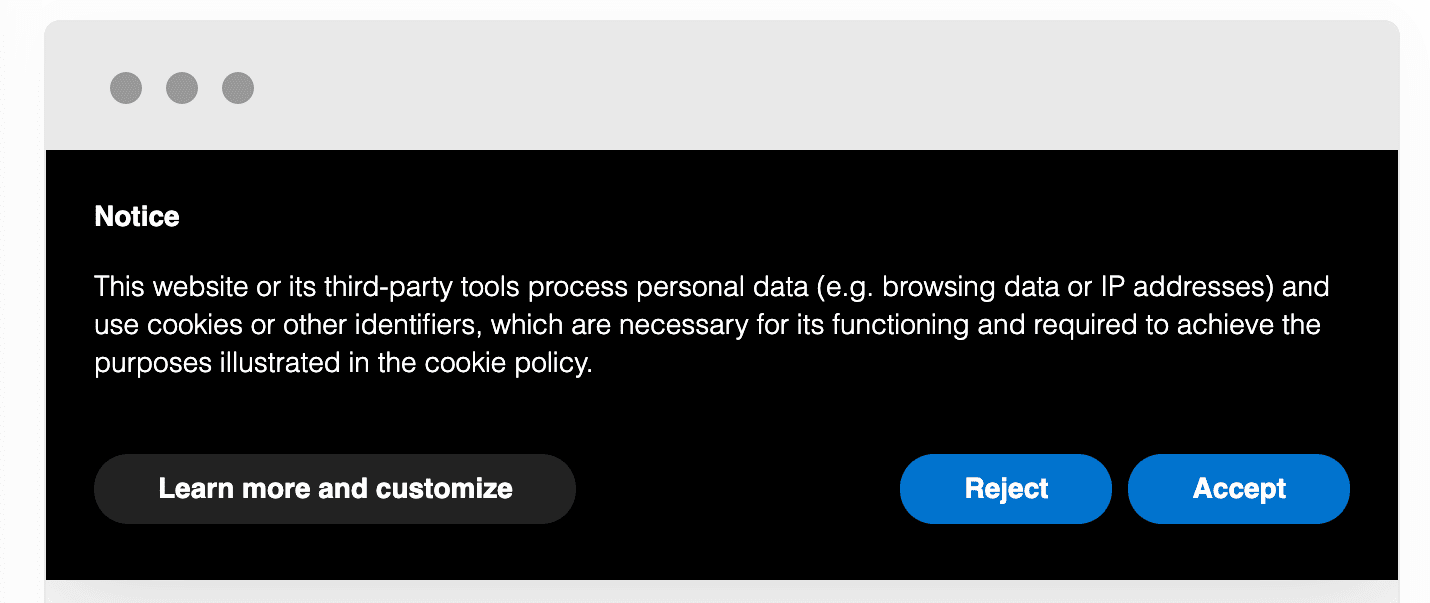
Ideally, your cookie opt-ins should explain, in clear language, what data you collect from your visitors, and what you use it for. Since we’re talking about an opt-in, it also should enable users to reject data collection.
An Introduction to Complianz

Complianz is a plugin that enables you to configure cookies notices and opt-in forms following different regions’ regulations. For example, it includes presets that you can use for the European Union, the United Kingdom, the United States, and Canada.
The plugin enables you to set up multiple styles of cookie opt-ins and notices, depending on the approach you want to take. Beyond cookie notices, the plugin can also generate privacy policy templates, and a standard Do Not Sell My Information (DNSMI) page (for CCPA requirements).
Complianz can also help you anonymize user information and block third-party cookies from services such as Facebook and Instagram. In short, it’s an all-in-one privacy tool for WordPress websites, and due to all those features, we decided to test it for ourselves.
Key Features:
- Generate standard cookie notices for different regions.
- Use cookie opt-in templates and customize them for your website.
- Store proof of content for GDPR requirements.
- Automatically generate privacy policies and DNSMI pages.
- Anonymize user information and block third-party cookies.
Price: Free with a premium version available | More Information
A significant part of Complianz’s draw is that it boasts that it can help you detect if you need to display a cookie consent form. Moreover, the plugin also mentions that it can help you determine what type of cookie opt-in you need to display depending on the regulations you want to follow.
With that in mind, we decided to check out the plugin personally. As soon as we activated it, a window popped up offering a quick-start tour:

Right away, the plugin asks you what privacy law or guideline you want to use as your default:
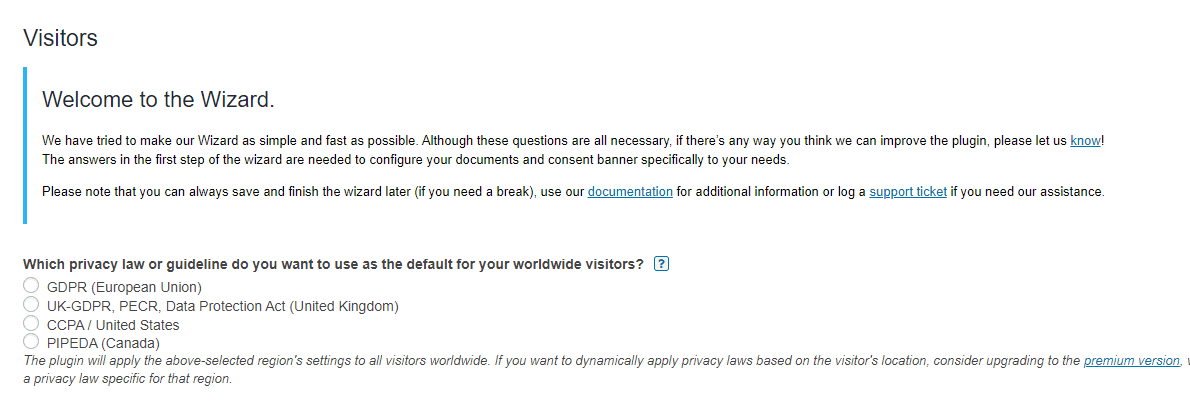
As a rule of thumb, you want to follow whichever regulation covers the region where most of your users are located in. For European countries, that would be the GDPR and the Data Protection Act. If your audience is mostly located in the US, you can go with the CCPA.
Next up, the plugin asks you if you want it to generate cookie and privacy policies for you or have it redirect users to pages of your choosing.
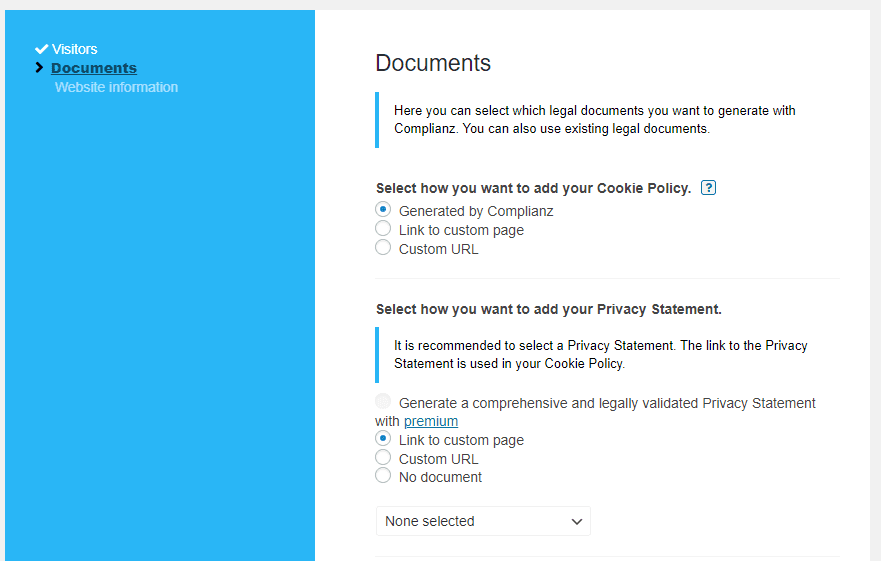
If you want Complianz to generate a cookie policy for you, it’ll ask for some identifying information. That includes who owns the website, a physical address, the country where you operate it, and more:
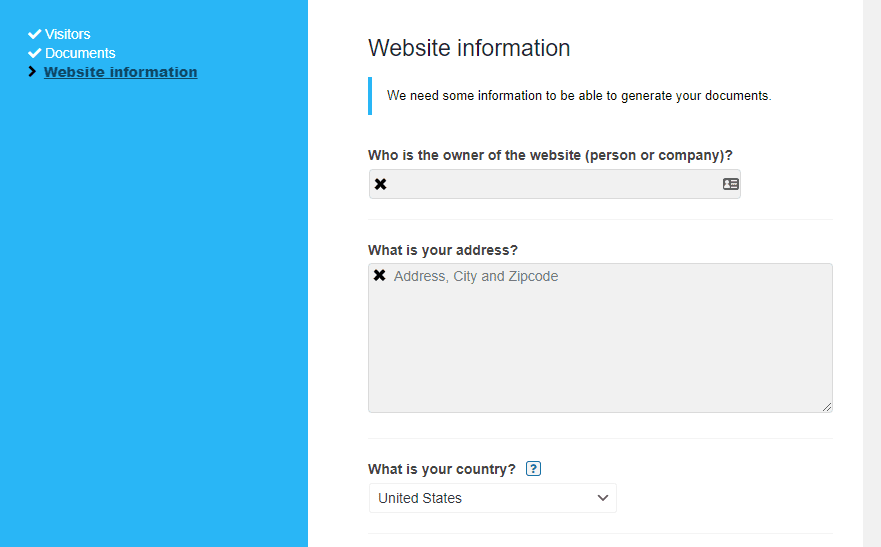
Now comes the interesting part – the plugin will run a cookie scan on your website which includes third-party scripts:

As you can see, our test website has plenty of cookies. However, that is normal for a modern WordPress website. Now Complianz will ask you if you collect analytics on your website and, if so, which service you use:
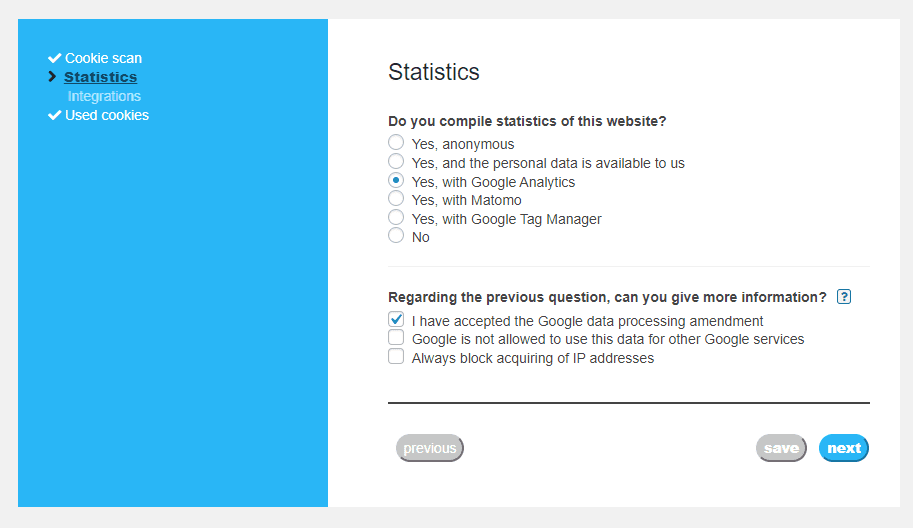
If you select an option such as Google Analytics, the plugin can anonymize the data you collect from your users such as their IP addresses. Keep in mind, though, there are other ways you can enable users to opt-out of analytics collection.
Finally, the plugin will tell you if you need a cookie opt-in or notice depending on all the information you’ve provided. The answer is usually yes, though:
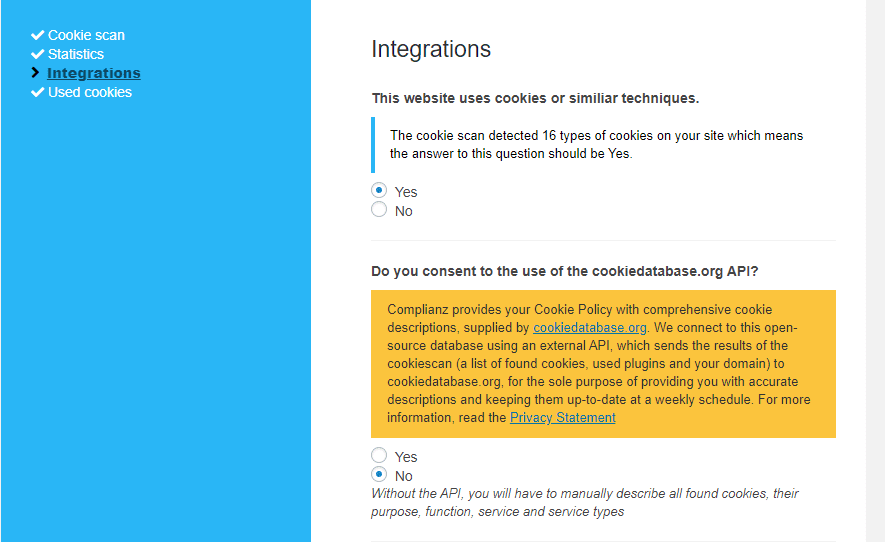
At this stage, Complianz will ask some final questions about third-party services connected to your website, embedded social media content, and advertisements. There’s even an option here that enables you to turn off data collection related to WordPress comments:
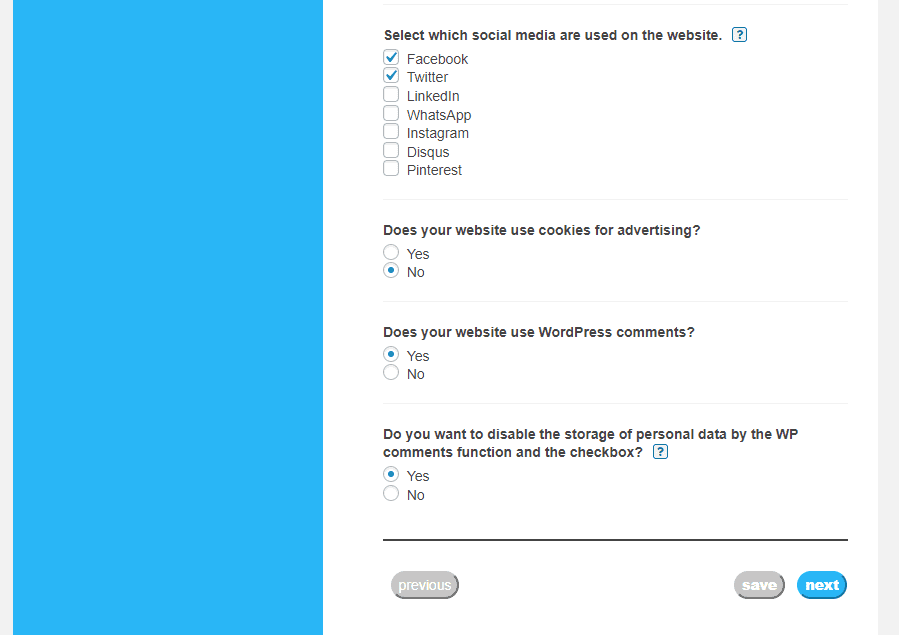
Moving on, the plugin will confirm what cookies you use and prompt you to add new pages to your site. In our case, it suggested we add a cookie statement or policy for the UK:
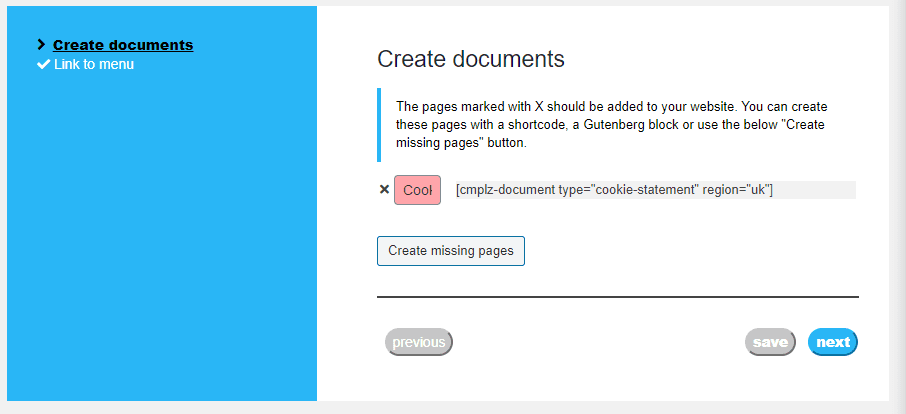
As you can see, the plugin gives you the option to add the policy using a custom shortcode or block. You can also use the Create missing pages button and generate a new page instantly.
Once you’re done with the configuration wizard, Complianz will automatically generate and set up your cookie compliance opt-in. Here’s what ours looks like:

As a user, you can either accept cookies outright or choose what kind of information your website can save. If you want to modify the style or text of your cookie opt-in, you can do so by going to the Complianz > Cookie Banner tab:
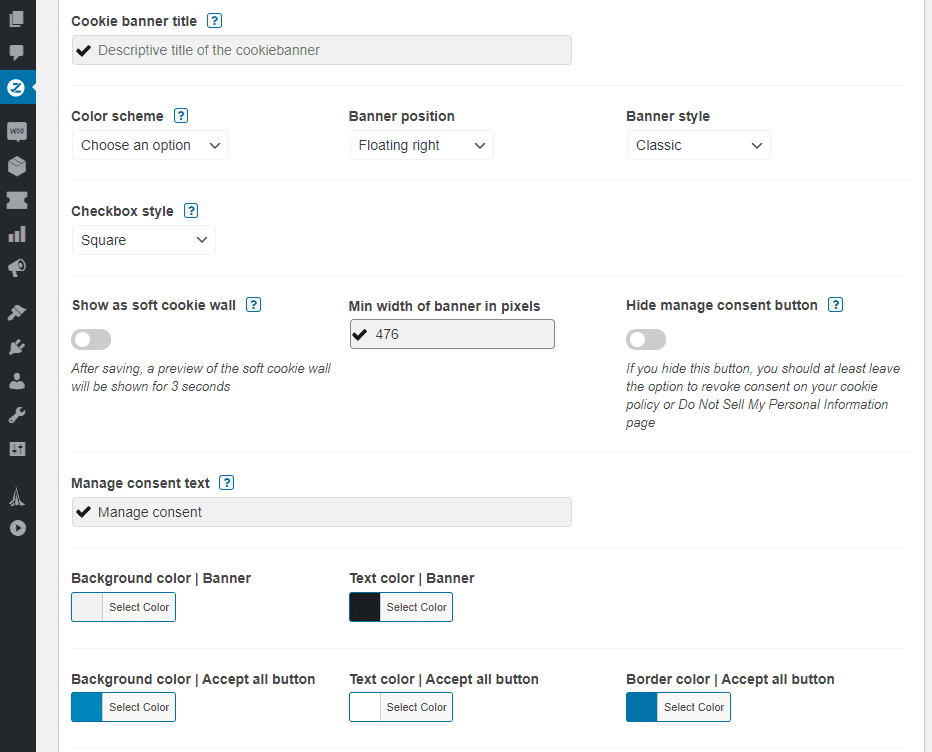
From this screen, you can easily modify any aspect of your cookie notice and add custom CSS.
Overall, the process of creating a cookie opt-in takes only minutes if you use the configuration wizard. Afterward, you can spend as much time as you like customizing the style and wording of your opt-in.
Conclusion
Understanding the ins and outs of all the data protection regulations that impact modern websites almost requires a law degree. However, for small and growing sites, you can cover your bases by implementing cookie opt-ins.
Complianz offers a remarkably thorough setup cookie opt-in setup experience. If you don’t know anything about cookie regulations, this plugin is a lifesaver. It can help you figure out precisely what type of opt-in you need and to set it up quickly.
Do you have any questions about how to implement cookie opt-ins in WordPress? Let’s talk about them in the comments section below!
Article thumbnail image by Focus_Vector / shutterstock.com







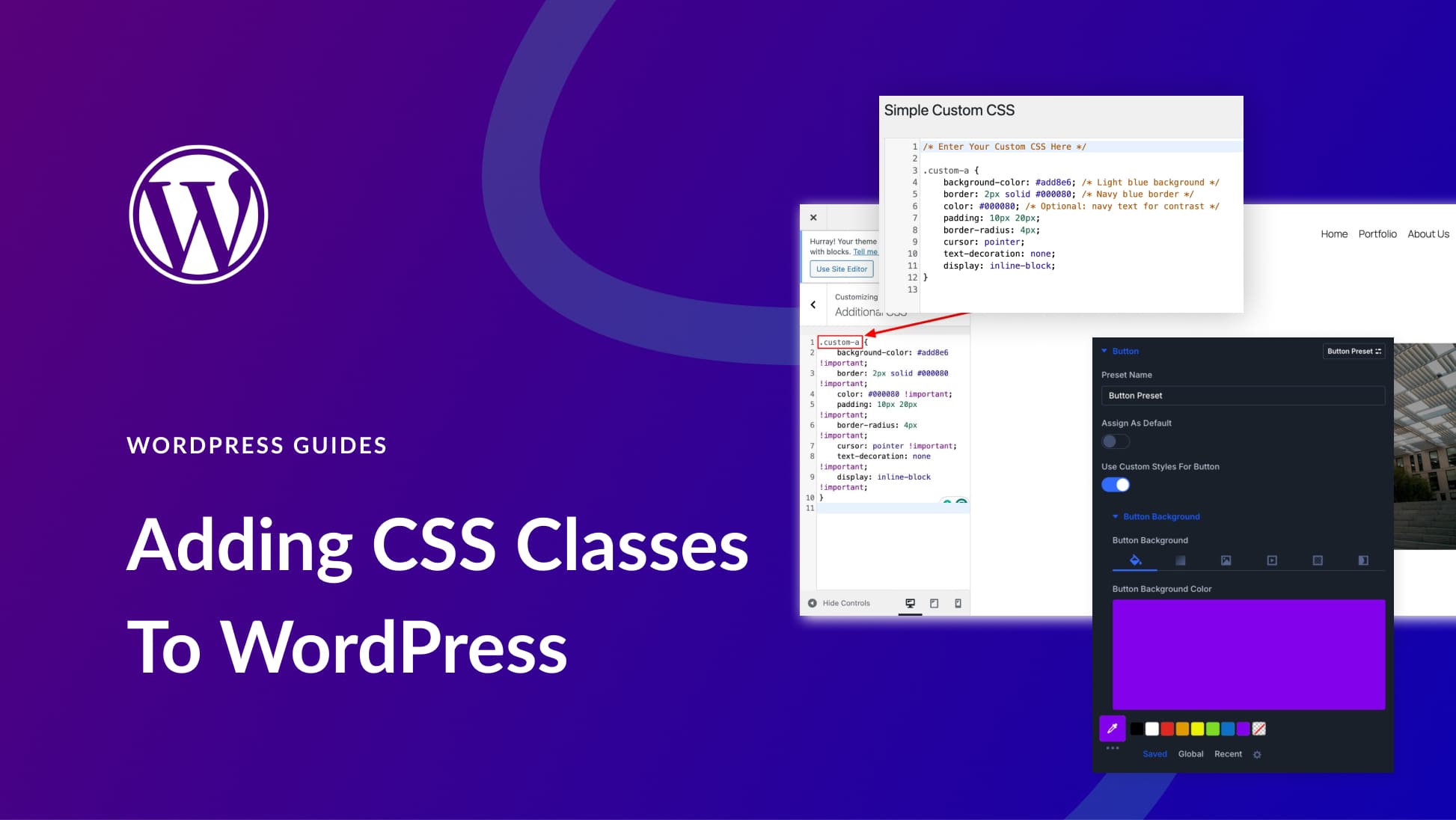

Do you need something like this if you only use Google Analytics? We don’t collect data and we don’t sell it. But obviously, with a WordPress site, we have plugins that place cookies (we also embed Facebook). Is this plugin overkill for a site like ours?
Hi Kris – great questions. Firstly, I’m not a lawyer, so I wouldn’t take my opinion as legal advice. If you’re really concerned, you should consult with an attorney, preferably one who has knowledge of privacy laws in your geographic area.
However, if you are using Google Analytics, you are collecting data. That’s how the tool is able to tell you information about your users. Also, as you yourself said, there are plugins on your site that may be placing cookies.
In my opinion, it’s always better to be overprepared than to assume you’re fine just because you’re not selling data or doing anything else nefarious with it. In other words, better to use this plugin and find out you don’t need it than to forgo adding some kind of opt-out option and then find out you’re accidentally breaking the law.
Hope that helps!
Wew! Great and helpful article ET 🙂
Glad you liked it, Kirby!
This is exactly what I need.Thanks you so much.
And what privacy laws are suitable for India? Does this plugin include?
Glad you found the post helpful, zaishi!
Unfortunately, I can’t provide you with legal advice regarding what privacy laws India has in place. These laws vary from country to country, and sometimes even between regions, so it can be tricky to pin down. You can look up your local privacy laws or (if you feel it’s necessary) speak with a lawyer who specializes in this area.
Complianz is geared toward North American and European sites. However, it can be useful to adhere to some legislation from other countries (such as the EU’s GDPR) on your own site if you expect a lot of traffic from that area. Also, you may find that that the GDPR or other laws Complianz follows covers all of India’s requirements as well – however, as I said, I’m not a lawyer and highly recommend you look into your local laws yourself!